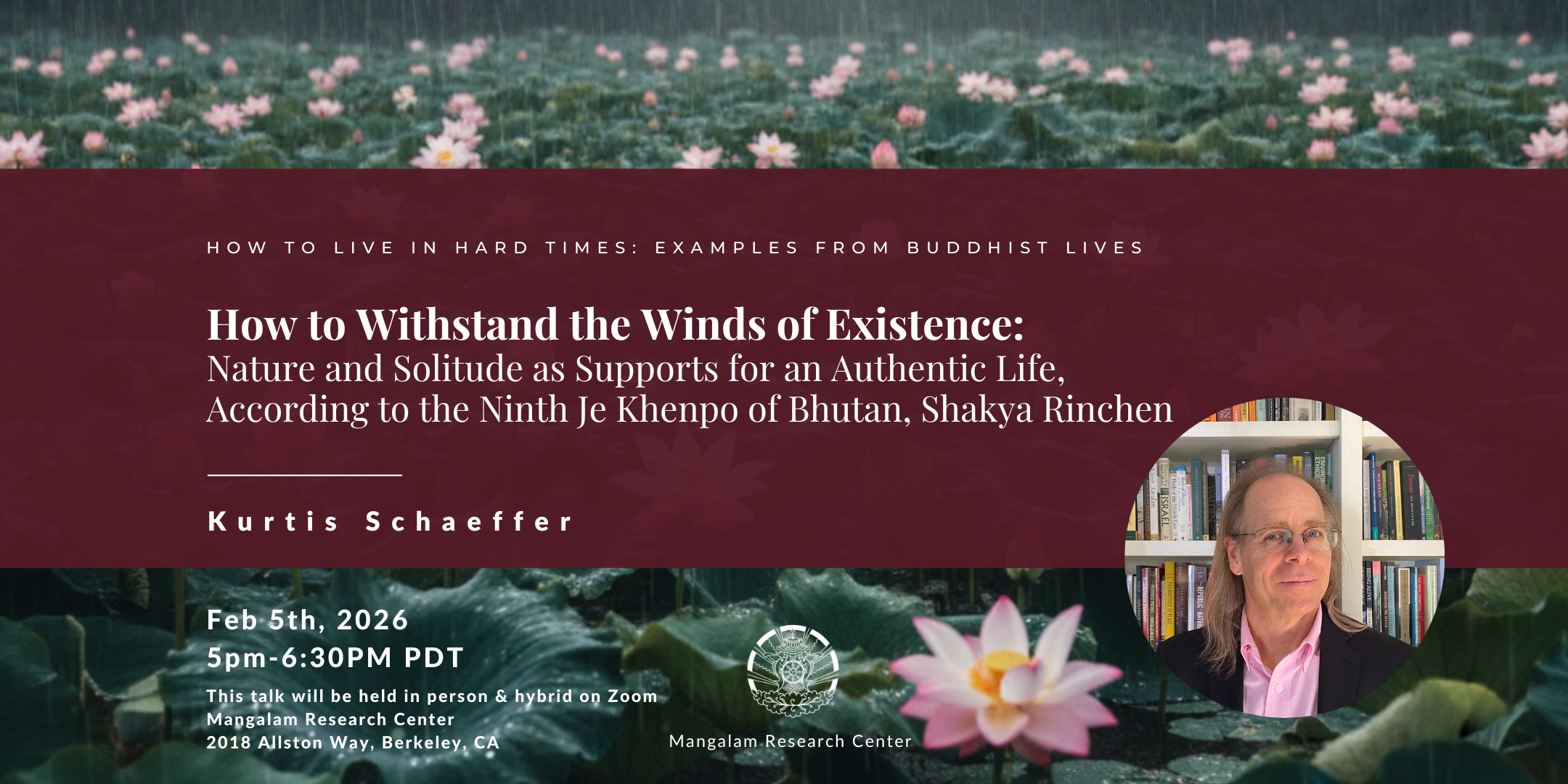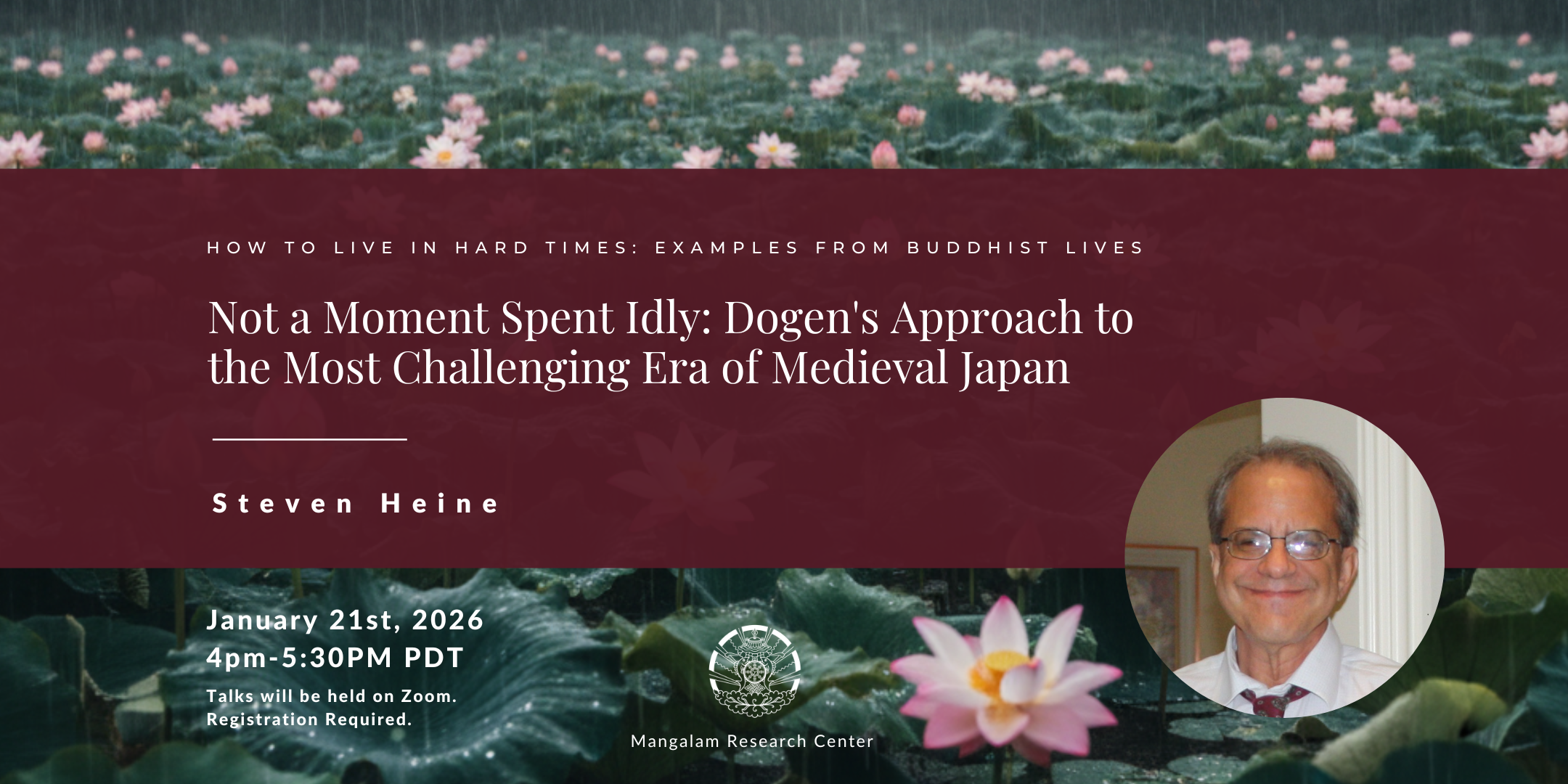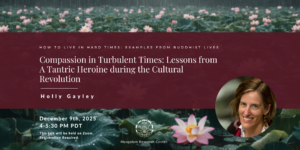How to Live in Hard Times: Examples from Buddhist Lives
The talks in this series respond to our need for inspiration in this moment, as scholars and as human beings. Each scholar has identified an historical figure who lived in times of personal and political upheaval, not unlike our own. Drawing on the writings of these figures, they highlight the value of literary works in provoking insight.
Dec 9, 2025, 4-5:30 PT, Holly Gayley, Compassion in Turbulent Times: Lessons from A Tantric Heroine during the Cultural Revolution,
January 21, 2026, 4-5:30 PT, Steven Heine,
Not a Moment Spent Idly: Dogen’s Approach to the Most Challenging Era of Medieval Japan
Feb 5, 2026, 5-6:30 pm PT, Kurtis Schaeffer, How to Withstand the Winds of Existence: Nature and Solitude as Supports for an Authentic Life, According to the Ninth Je Khenpo of Bhutan, Shakya Rinchen
Upcoming Event

How to Withstand the Winds of Existence: Nature and Solitude as Supports for an Authentic Life, According to the Ninth Je Khenpo of Bhutan, Shakya Rinchen
Feb 5th (5-6:30 pm PT)
Past event
Not a Moment Spent Idly: Dogen's Approach to the Most Challenging Era of Medieval Japan
January 21, 2026 (4-5:30 PT)

Zen master Dōgen (1200-1253), founder of the Soto sect in thirteenth century Japan, was born into turbulent times and continually encountered challenges on personal, political, and philosophical levels throughout his lifetime. Medieval Japan was wracked by constant civil warfare and social instability in addition to a series of natural disasters that wreaked havoc on the capital city of Kyoto. According to a famous epic narrative from this period, “Human pride doesn’t stand for long, like a passing dream on a night in spring. Even the bravest are in the end brought down, no more than dust cast about by the wind.” Dogen himself was orphaned as a young child and came into conflict with the leading priests when he questioned orthodox doctrine at age fourteen. He became skeptical of corruption in the temple halls of China and Japan and was forced to flee Kyoto by rival sects before turning down offers from government leaders to lead a new monastery or to receive the prestigious purple robe.
His outlook was based on a resilient commitment to persevering each and every moment of existence through carrying out a diligent dedication to the principles of dignity and integrity. Near the end of his life, he wrote a poem titled, “Not a Moment Spent Idly in Twenty-Four Hours”: “Over forty years have so quickly passed! / Day and night, I followed / The path of the sun and moon, / Which, like the hare and crow, / Travel swiftly in the sky.” This talk will examine what Dogen meant by referring to non-idleness, or a sustained approach to self-exertion (gyōji), and how this practice method functioned for him in the face of personal and political upheaval.
Steven Heine is professor and founding director of the Asian Studies Program at Florida International University. A recipient of the Order of the Rising Sun Award for a lifetime of service to the dissemination of Japanese culture in the west, Heine has published forty books on East Asian religion and society, particularly dealing with the origins of Zen Buddhism in China and the impact on Dogen’s life and thought, as well as the transmission of the Soto sect to Japan. Some of the titles include The Zen Poetry of Dogen, Did Dogen Go to China?, Dogen: Textual and Historical Studies, Readings of Dogen’s Treasury of the True Dharma Eye, and Dogen: Japan’s Original Zen Teacher

“Compassion in Turbulent Times: Lessons from A Tantric Heroine during the Cultural Revolution,”
Dec 9, 2025 (4-5:30 PT)
The lives of Buddhist masters offer inspiration and solace not just for practice but also for dealing with challenges during times of upheaval. Stories of survival through the Cultural Revolution for Tibetans under Chinese colonial rule are especially potent. As one example, Khandro Tare Lhamo served as a beacon of hope for her local community in the nomadic region of Golok (eastern Tibet) during the horrors of widespread famine, cultural destruction, imprisonment of secular and religious leaders, political reeducation, and more. Unlike “scar literature” of the post-Mao era, her life story presents a redemptive narrative with a tantric heroine at the fore. In several tales, she remains “unscarred” in struggle sessions and rescues others from calamities by maintaining compassion at the forefront of her mind. Thereafter, Khandro Tare Lhamo was one of a circle of surviving Nyingma masters to “heal the damage of degenerate times” during the post-Mao era and revitalize Buddhist practices, teachings, and institutions in the region of Golok. Her story can help inspire our own courage and compassion during the political turbulence of our times in order to be of service and heal collective trauma.
Holly Gayley is a scholar and translator of Buddhist literature in contemporary Tibet and associate professor at the University of Colorado Boulder. Her research explores gender and sexuality in Buddhist tantra, literature by and about Tibetan and Himalayan women, ethical reform in contemporary Tibet, and theorizing translation, both literary and cultural, in the transmission of Buddhist teachings to North America. She is author of Love Letters from Golok: A Tantric Couple in Modern Tibet (2016) and editor of Voices from Larung Gar: Shaping Tibetan Buddhism for the Twenty-First Century (2021).
